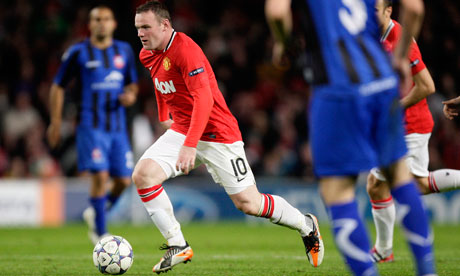
To be fair to Sir Alex Ferguson, he did admit when pressed that playing Wayne Rooney as a sitting midfielder was likely to be only a short-term experiment, a solution to the combined problems of Manchester United having a few injuries in that department and needing to tighten up their defensive act.
Unless you managed to read that significant rider amid Thursday morning's headlines, however, you may be under the impression that England's best striker has been reborn in a new position, and that what has happened so far in the player's career will only be a prelude to what is to come from Rooney the midfield maestro.
The question is an academic one as far as Fabio Capello is concerned, because Rooney is banned from England's next competitive games and therefore unlikely to feature in any of the preceding friendlies, yet one would doubt very much that the Italian left Old Trafford on Wednesday pondering whether to leave out Scott Parker or Gareth Barry to accommodate Rooney when he next becomes available, or thrilled at the prospect of giving Darren Bent or Jermain Defoe a clear run up front instead.
Well as Rooney played against Otelul Galati, and an 88% pass completion rate gives a fair reflection of the effectiveness of his distribution in his new role, he was still playing out of position. That is to say, he is nowhere near as good a midfield player as he is a conventional forward or striker. And though there are plenty who believe, with good reason, that his most effective position of all may be the sort of combination of the two roles that Paul Scholes achieved in his pomp, Rooney on Wednesday was playing much deeper than that, operating just in front of his back four and staying back in a manner that Scholes resorted to only right at the end of his career when his legs had gone.
That simply cannot be Rooney's best position. Of course he can do a job there if required; when you are good enough on the ball you can play most positions. Like George Best, Rooney could fill any outfield position without disgracing himself, though his lack of inches would be a handicap at centre-half. But asking Rooney to operate mostly in his own half is a complete waste of his talent for attack.
There are plenty of players who can ping the ball around the pitch, especially against a side as defensive as Galati who hardly sent anyone upfield to put pressure on the ball in the areas where Rooney received it, but how many can unlock defences in the way Rooney can, score spectacular goals or just make things happen in the final third?
One thing was for sure against Galati, Dimitar Berbatov could not oblige, and though Michael Owen was unlucky to depart early, his replacement Javier Hernández had a rare off-day too. United are not so fantastically well-endowed with striking talent that they can afford to keep Rooney away from the sharp end, and though Ferguson can justifiably claim that the last two results have been exactly what was required and that United have followed up their mauling at the hands of Manchester City with three clean sheets, Aldershot, Everton and Otelul Galati are limited sides quite a long way from the first rank of opponents.
It is also worth pointing out that only in the Carling Cup game at Aldershot, now 13th in League Two, were United winners by a clear and comfortable margin. At Everton last Saturday they were under siege for long periods and Ferguson admitted they were lucky when Leighton Baines hit the bar. In the Champions League game they were flattered in the end by a massive deflection for a late second goal, and though Galati did not manage to give David de Gea many scary moments, a penalty conceded, a mistake or a freak goal could easily have changed the whole night for United, a point Gary Neville was quick to make in his television summary.
Against both Everton and Galati Ferguson's players gambled that one goal would be enough, and while they got away with it on both occasions, it seems silly to pretend that playing in such a way would be a good idea against top-half Premier League teams or the next level of European opponents. Just as Everton v Manchester United was fairly flat on Saturday for what is normally one of the most crowd-pleasing of fixtures, so the majority of the crowd trooped out of Old Trafford on Wednesday muttering that the quality of entertainment was low, the attacking ambition likewise, and they did not feel they had seen the real United.
They had certainly not seen the real Rooney, even if he did win the man of the match award. The real Rooney has more to his game than launching 50-yard passes from his own half and setting up Berbatov and Hernández to fire blanks. The real Rooney can play in midfield, but his talent is for attack, not defence. Against teams with more about them than United's recent opponents the defensive midfielder may have to do some actual defending, and there is always the fear that Rooney's temperament, if not his technique, may let him down under real pressure. But more than anything else, United's frontline misses his presence.
Ferguson has made his point now, United cannot afford to be cavalier all of the time. But neither can they afford to withdraw their biggest asset from the frontline. They are not the same team without him.

